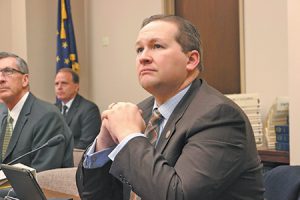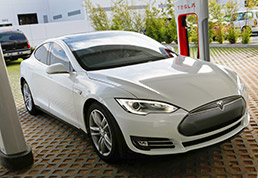Indiana House OKs road-funding plan with tax increases
The Indiana House has approved a road-funding plan that would raise the gasoline tax by 10 cents and increase vehicle registration fees to fund improvements to the state's infrastructure.
The Indiana House has approved a road-funding plan that would raise the gasoline tax by 10 cents and increase vehicle registration fees to fund improvements to the state's infrastructure.
State Sen. Jon Ford’s bill would have moved gambling slots from the Rising Star casino near Cincinnati to Terre Haute, his district, and allowed for the construction of a new gaming facility.

Raising the cigarette tax by $1 per pack would help pay for Medicaid spending and tobacco-cessation programs—and would help patch the $300 million annual hole in the budget created by the House’s road-funding plan.
The Indiana Senate has followed the House’s lead and voted to override two bills that former Gov. Mike Pence vetoed last year. The Senate’s votes Tuesday mean the bills become law.
The bill comes on the heels of Carmel’s recent decision to send letters to 28 residents who rent out their homes on Airbnb, stating that they are in violation of city zoning laws.
An Indiana House committee voted Tuesday to create a special summer committee to study the possibility of repealing an Indiana law requiring people to get a license before carrying a handgun.
An 11-year-old Indiana girl died in an all-terrain vehicle crash in 2015, and her mother has been pushing to change laws on helmets and safety education.
Currently, the 10,000 CPAs in Indiana do 120 hours of continuing professional education every three years to renew their CPA licenses. The proposal could reduce learning time and boost comprehension.

The Indiana Chamber of Commerce, organized labor groups and a bipartisan group of lawmakers have for years pushed the Legislature to implement a work-sharing program.
Supporters of expanding state-funded preschool said they are frustrated the bill includes what they view as an expansion of the private school voucher program.
They’re calling the plan “No New Taxes” and arguing Indiana can pay for major road-funding improvements without raising the gas tax.
Public health officials say the increase is a proactive approach toward reducing the smoking rate and would serve as a deterrent for young people to even begin.
Lawmakers are advancing a bill that would compel large, online retailers to collect and send sales taxes to the state—injecting Indiana into a national tussle over the issue.
Grocery chains, convenience stores and pharmacies have pushed for years to have Indiana's eight decades-old ban lifted and be able to sell alcohol on Sundays, but a compromise has been elusive.
Judges would be selected by a nominating commission and the governor—rather than through elections—under the proposal that is supported by Republicans and opposed by some Democrats.
The author of the bill, Rep. Ed Soliday, said he believed the amended measure would make people on both sides of the bill “equally happy and equally unhappy.”
Senate Bill 354 would let Rising Star Casino Resort in Southern Indiana’s Ohio County move 740 gaming positions to Terre Haute.
The measure also removes employment protections for smokers, raises the age for purchasing cigarettes to 21 and directs more money to tobacco-cessation programs.

A House committee will make changes to a bill after critics charged that the measure would have blocked car maker Tesla from doing business in Indiana.
The voucher language has injected some controversy into a bill that has received bipartisan support.